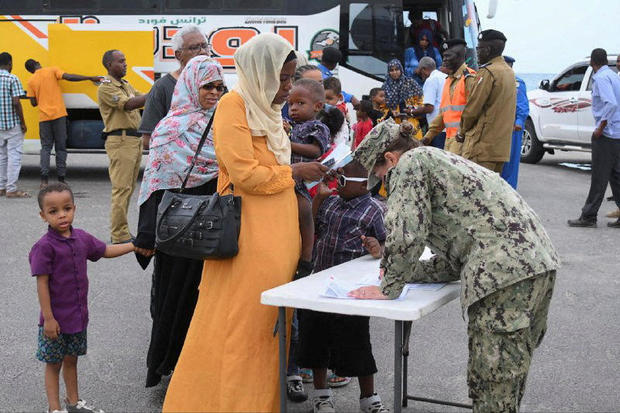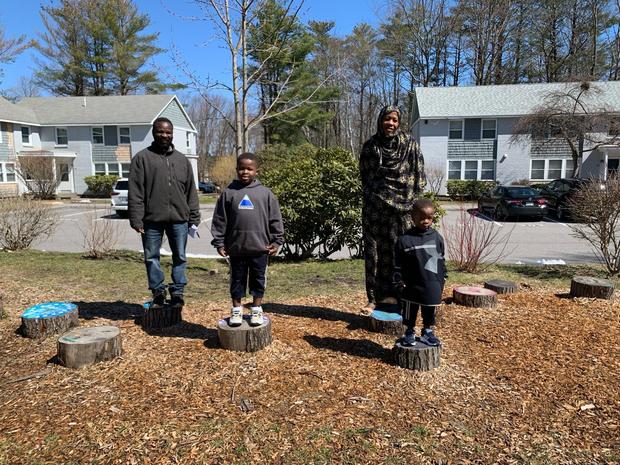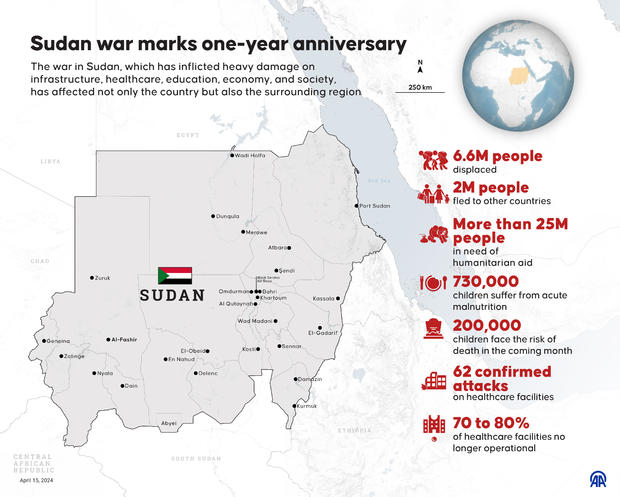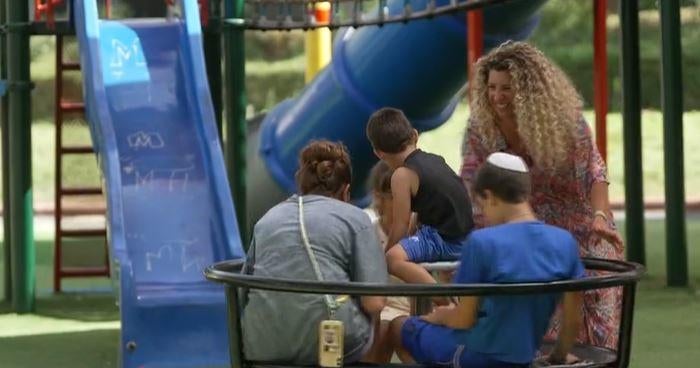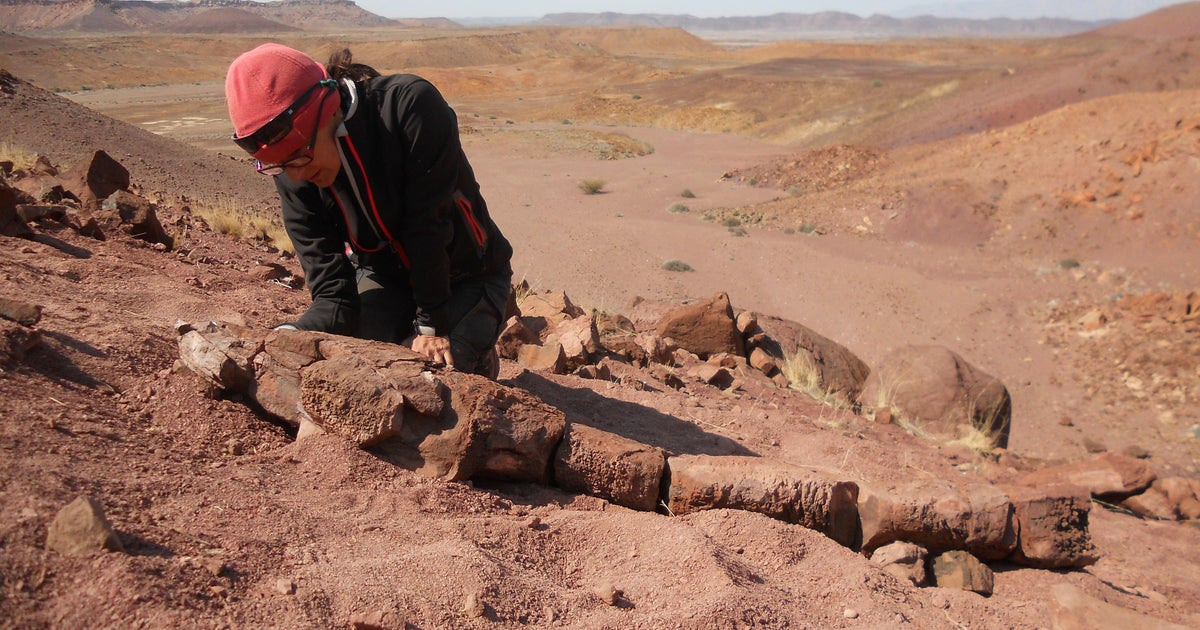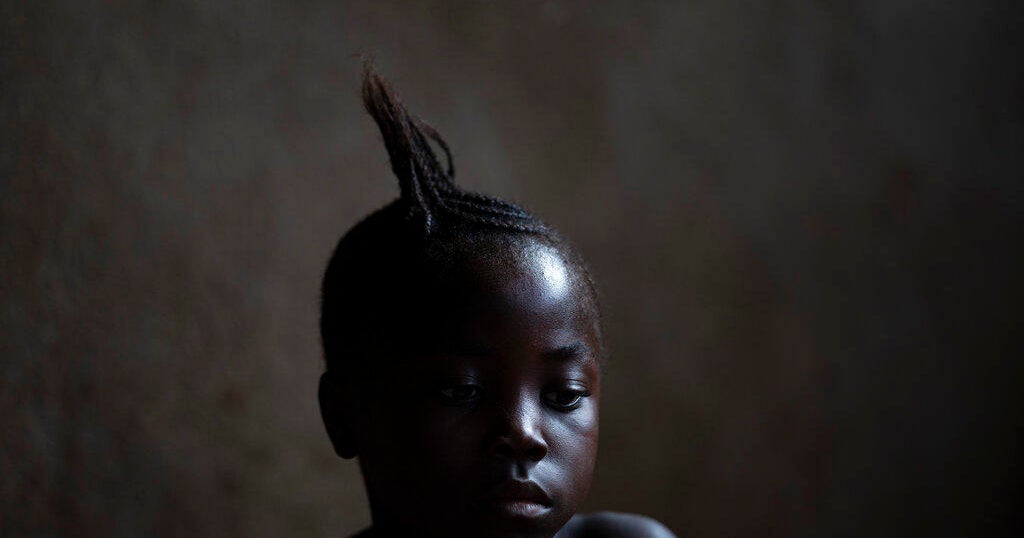CBS News
Escaping Sudan’s year-long civil war was just the first hurdle to this American family’s “dream come true”
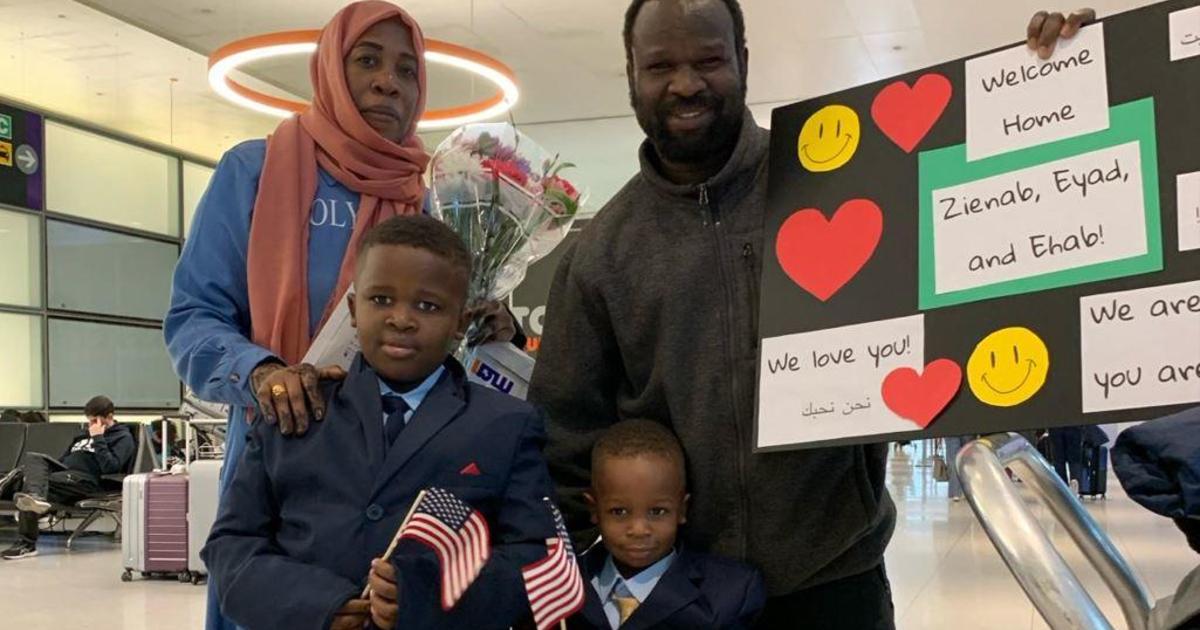
“Tears were running down my face,” El-Fadel Arbab told CBS News of his joyous reunion with his wife and two young sons. “I just wanted to cry from all the happiness.”
After 332 anxious days brought on by the war that has now raged in Sudan for a year, the Sudanese-American’s worry, work, and wait to reunite with his family finally came to an end.
One day in late March, Arbab waited in the arrivals hall at Boston’s Logan International Airport, holding a poster decorated with red hearts and yellow smiley faces he’d cut out himself. In English and Arabic were the phrases: “We love you!” and “We are happy you are here!”
The security doors opened, and 3-year-old Ehab and 7-year-old Eyad, both sporting blue suits and ties, entered the United States for the first time. Zienab Abaker, in a peach-colored head covering, smiled and hugged her husband.
Courtesy of El-Fadel Arbab
A nightmare, followed by “a dream come true”
Arbab’s family fled Sudan’s embattled capital city of Khartoum with a United Nations convoy just two weeks after war broke out. They made it to the Port of Sudan, on the country’s east coast, joining millions of others trying to escape the bloodshed as rival military and paramilitary commanders battled for power over the country.
A U.S. Navy ship ferried Abaker and her boys, along with 300 other refugees, east across the Red Sea to the Port of Jeddah, in Saudi Arabia. But by then, her husband Arbab, working in Portland, Maine, had lost contact with his family.
“No WiFi. No phone. We were researching if any news or anything,” he said.
Then, last sprint, he saw a photograph of his wife and boys featured in an article on CBSNews.com, part of a series of reports as our team sailed from Jeddah to Port Sudan and then back again on a Saudi naval ship ferrying refugees. The image, taken by a Reuters photographer, showed Abaker and the boys undergoing screening by a U.S. soldier at Port Sudan. It was proof they had safely made it to the coast, at least.
“I was just in tears,” he said. “It was like a dream come true.”
STRINGER/REUTERS
He expected his wife and sons to arrive within weeks, so he quickly rented a two-bedroom apartment and furnished it with donations from the community where he’s lived for the past two decades.
But his family’s journey had just begun. They made it to Saudi Arabia, but that’s where they got stuck.
While Arbab’s sons are U.S. citizens by birth, his wife is not. The family had submitted all the necessary paperwork for her to get a visa to enter the U.S. before the war broke out, but it had not yet been issued.
Arbab jumped through U.S. immigration hurdle after hurdle, brandishing the photograph of his family at Port Sudan to officials at the State Department in the U.S. and embassy officials in Saudi Arabia, while also working three jobs to support his family 6,000 miles away and to pay for the new apartment in Maine.
Meanwhile, Abaker was stuck living in a hotel, taking care of her sons alone, not permitted to leave, and in constant fear of being arrested and deported back to Sudan. The younger boy, traumatized by the conflict he’d escaped, stayed up at night and slept during the day.
“She is strong and patient,” said Arbab, “but had no room for happiness.”
Finally, there was reason to smile.
“The only happiness was when she received her passport. They say you get the visa and you’re going to the United States and your husband. Then she felt like she could be happy,” he recalled.
Courtesy of El-Fadel Arbab
Arbab said his family were the first Sudanese nationals to make it out of their limbo in Saudi Arabia and reach the U.S., for which he’s extremely grateful. But he added that “dozens and dozens” of people remain stuck in similar circumstances.
War traps millions in an “apocalyptic catastrophe”
There has been no sign of the vicious conflict between the Sudanese Armed Forces and the rival Rapid Support Forces paramilitary group easing since it erupted on April 15, 2023. Before turning against each other, the rival generals who led those well-armed groups staged a coup together against a fragile transitional government that had been trying to steer Sudan toward democracy.
Since they fell out, their war has killed 14,000 men, women and children, according to the United Nations. More than 8.2 million people have been displaced from their homes, with those who’ve been able fleeing abroad, and countless others seeking any respite they can find in a country with little access to food, running water or health care.
“Khartoum has collapsed into a warzone for the past year and millions of Sudanese remain trapped there, essentially blockaded,” Alan Boswell, Horn of Africa project director at the International Crisis Group think tank told CBS News.
“Millions of Sudanese are barreling into famine and could starve to death this year,” he said, calling it “the sort of apocalyptic catastrophe that seems something only for the history books.”
On Monday, the grim one-year anniversary of Sudan’s war, France hosted an international conference to raise money for the war-torn country from Western and Gulf nations.
Aid shortfall as the world focuses “on the new thing”
Boswell, speaking to CBS News from the sidelines of the conference, said the humanitarian mission was about ensuring both funding and security for Sudan — both of which he stressed were severely lacking. While the U.N. estimates that $2.7 billion is required urgently to assist the people of Sudan, only $166 million has been received so far — a mere 6% of the total.
“Ideally, there would be an announcement of hundreds of millions of dollars more that have been committed for humanitarian relief in Sudan. But a big part of the problem has been the Sudanese army side of the war essentially blocking food relief into areas they don’t control, which is much of the country.”
Yasin Demirci/Anadolu/Getty
Late Monday, French President Emmanuel Macron announced the conference had seen an additional $2.1 billion of assistance pledged to Sudan, but he gave no breakdown of who the donors were, or any timeline on when the money might actually start to help on the ground.
Arbab told CBS News from his home in Portland that, from what he could tell, “as long as there are more wars starting somewhere,” powerful Western governments will simply continue to “focus on the new thing and forget about the old one.”
“It did not go unnoticed that the only time the world really focused on the Sudan war was in getting its own citizens evacuated,” agreed Boswell. “Then interest in the Sudan war rapidly dissipated.”
But he warned that “the conflict might not stay inside Sudan,” noting that the African nation is surrounded by other fragile states, many of them also gripped by conflict, “and there’s quite a large risk of the instability spreading.”
CBS News
As sunscreen misinformation spreads online, dermatologists face real-life impact of online trends

With the holiday weekend in full swing, the anti-sunscreen movement’s recent spike is worrying dermatologists.
“It was not like this before,” Dr. Jeanine Downie, a board-certified dermatologist with her own practice in New Jersey told CBS News Confirmed. “I see easily six patients per week that are anti-sunscreen, where it used to be maybe one every other week or one a month. And now it’s just gotten crazy.”
Downie says in the last two weeks she’s diagnosed three squamous cell and two malignant melanomas, both of which can turn cancerous if not caught early. “And that’s me, just one little dermatologist,” she said.
This movement picked up steam in June, with creators on TikTok telling followers in no uncertain terms “stop wearing sunscreen.” At first, the posts received tens of thousands of views and likes. Dermatologists on the platform then began sharing their own reactions, with those videos gaining even more views. And more recently, influencer Nara Smith went viral sharing an at-home sunscreen recipe to her 8 million followers that dermatologists say does little to protect wearers from sun damage.
Dr. Shereene Idriss, a New York dermatologist who has amassed more than a million followers on her social media channels, is trying to leverage that influence to educate users about sunscreen and sun protection.
“It’s becoming more and more difficult, I think, as a consumer, to try to weed through the noise,” Idriss told CBS News Confirmed.
This misinformation reflects the surprising reality of how some young Americans view sun safety. A study by the Orlando Health Cancer Institute in March found that 1 in 7 adults under the age of 35 say daily sunscreen use is more harmful than direct sun exposure. “I tell my patients, if you want your face to look like a leather bag later, then that’s up to you,” Downie said. About 6.1 million adults are treated each year for basal cell and squamous cell carcinomas according to the CDC. Skin cancer is the most common type of cancer in the country.
“They only want the natural things,” said Downie. “But I tell them all the time, sitting in traffic here in the tri-state area, the level of pollutants in the air on a daily, weekly and monthly basis is significantly more toxic than any chemical they’re going to rub into their skin with sunblock.”
While there’s no evidence that sunscreens are unsafe, the FDA is currently investigating potential concerns. It’s called for more data on 12 ingredients often found in U.S. sunscreen. After conducting its own study into how certain ingredients are absorbed into the bloodstream, the FDA has called for more research into potential health effects on the body.
However, beachgoers on the Jersey Shore this week told CBS News that sun safety is top of mind this summer. CBS News Confirmed looked at Google Search trends and saw terms like “sunscreen” and “what does skin cancer look like” are at an all-time high since tracking began in 2004.
“You know what gets them to start wearing sunblock?” said Downie. “Young kids and young adults, Gen Z, Gen X, they hate pores. And once they hear that they’re going to have big pores that look like potholes, they put that sunblock on.”
The dermatologists CBS Newsspoke with say there is no such thing as a healthy tan. To best protect yourself this summer, they say to use sunscreen and reapply often; wear UPF clothing or UV visors; and avoid being outside during peak UV index between 10 a.m. and 2 p.m.
CBS News
7/5: CBS Evening News – CBS News

Watch CBS News
Be the first to know
Get browser notifications for breaking news, live events, and exclusive reporting.
CBS News
Moderate Masoud Pezeshkian wins Iran’s presidential runoff election
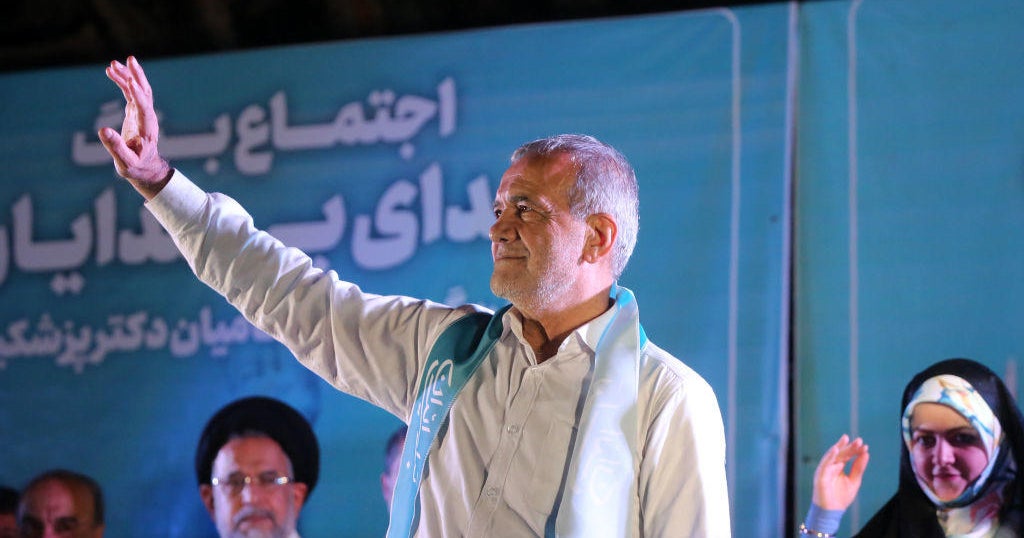
Reformist candidate Masoud Pezeshkian won Iran’s runoff presidential election Saturday, besting hard-liner Saeed Jalili by promising to reach out to the West and ease enforcement on the country’s mandatory headscarf law after years of sanctions and protests squeezing the Islamic Republic.
Pezeshkian promised no radical changes to Iran’s Shiite theocracy in his campaign and long has held Supreme Leader Ayatollah Ali Khamenei as the final arbiter of all matters of state in the country. But even Pezeshkian’s modest aims will be challenged by an Iranian government still largely held by hard-liners, the ongoing Israel-Hamas war in the Gaza Strip, and Western fears over Tehran enriching uranium to near-weapons-grade levels.
A vote count offered by authorities put Pezeshkian as the winner with 16.3 million votes to Jalili’s 13.5 million in Friday’s election.
Fatemeh Bahrami/Anadolu via Getty Images
Supporters of Pezeshkian, a heart surgeon and longtime lawmaker, entered the streets of Tehran and other cities before dawn to celebrate as his lead grew over Jalili, a hard-line former nuclear negotiator.
But Pezeshkian’s win still sees Iran at a delicate moment, with tensions high in the Mideast over the Israel-Hamas war in the Gaza Strip, Iran’s advancing nuclear program, and a looming U.S. election that could put any chance of a detente between Tehran and Washington at risk.
The first round of voting June 28 saw the lowest turnout in the history of the Islamic Republic since the 1979 Islamic Revolution. Iranian officials have long pointed to turnout as a sign of support for the country’s Shiite theocracy, which has been under strain after years of sanctions crushing Iran’s economy, mass demonstrations and intense crackdowns on all dissent.
Government officials up to Supreme Leader Ayatollah Ali Khamenei predicted a higher participation rate as voting got underway, with state television airing images of modest lines at some polling centers across the country.
However, online videos purported to show some polls empty while a survey of several dozen sites in the capital, Tehran, saw light traffic amid a heavy security presence on the streets.
The election came amid heightened regional tensions. In April, Iran launched its first-ever direct attack on Israel over the war in Gaza, while militia groups that Tehran arms in the region — such as the Lebanese Hezbollah and Yemen’s Houthi rebels — are engaged in the fighting and have escalated their attacks.
Iran is also enriching uranium at near weapons-grade levels and maintains a stockpile large enough to build several nuclear weapons, should it choose to do so. And while Khamenei remains the final decision-maker on matters of state, whichever man ends up winning the presidency could bend the country’s foreign policy toward either confrontation or collaboration with the West.
The campaign also repeatedly touched on what would happen if former President Donald Trump, who unilaterally withdrew America from the Iran nuclear deal in 2018, won the November election. Iran has held indirect talks with President Joe Biden’s administration, though there’s been no clear movement back toward constraining Tehran’s nuclear program for the lifting of economic sanctions.
More than 61 million Iranians over the age of 18 were eligible to vote, with about 18 million of them between 18 and 30. Voting was to end at 6 p.m. but was extended until midnight to boost participation.
The late President Ebrahim Raisi, who died in a May helicopter crash, was seen as a protégé of Khamenei and a potential successor as supreme leader.
Still, many knew him for his involvement in the mass executions that Iran conducted in 1988, and for his role in the bloody crackdowns on dissent that followed protests over the 2022 death of Mahsa Amini, a young woman detained by police over allegedly improperly wearing the mandatory headscarf, or hijab.



